新概念英语第一册第55课Lesson55课文单词知识点
- 格式:doc
- 大小:102.50 KB
- 文档页数:1
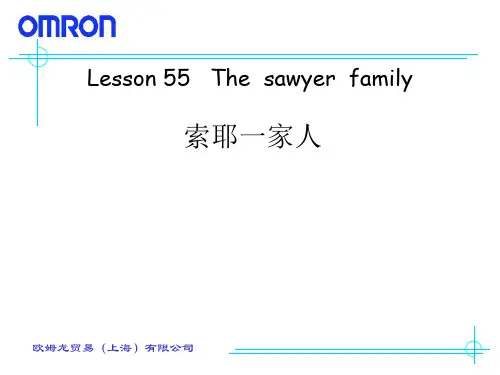

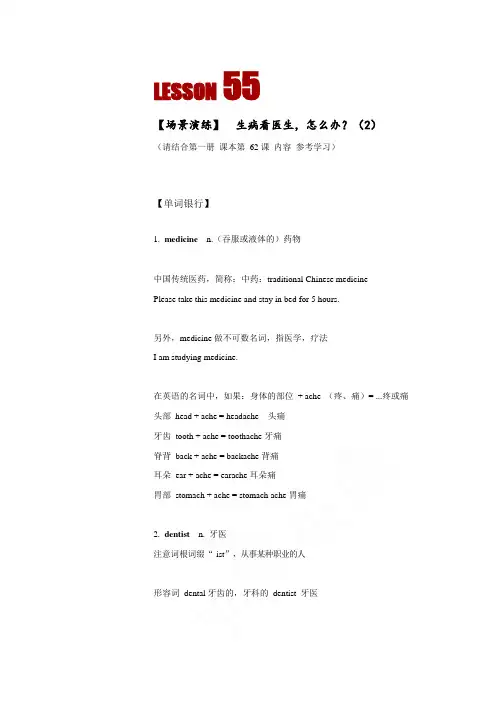
LESSON 55【场景演练】生病看医生,怎么办?(2)(请结合第一册课本第62 课内容参考学习)【单词银行】1.medicine n.(吞服或液体的)药物中国传统医药,简称:中药:traditional Chinese medicinePlease take this medicine and stay in bed for 5 hours.另外,medicine 做不可数名词,指医学,疗法I am studying medicine.在英语的名词中,如果:身体的部位+ ache (疼、痛)= ...疼或痛头部head + ache = headache 头痛牙齿tooth + ache = toothache 牙痛脊背back + ache = backache 背痛耳朵ear + ache = earache 耳朵痛胃部stomach + ache = stomach ache 胃痛2.dentist n. 牙医注意词根词缀“-ist”,从事某种职业的人形容词dental 牙齿的,牙科的dentist 牙医【场景演练】生病看医生,怎么办?(2)艺术家art + ist = artist小说家novel (名词,小说)+ ist = novelist旅行家tour + ist = tourist钢琴家pian (o) + ist = pianist [ˈpɪənɪst]3.temperature ['temprətʃə(r)]n. 温度场景一:指气温The temperature is very high today.低的low场景二:体温His temperature is rising.She is running a temperature. 她正在发烧。
He has a temperature.I am going to take your child’s temperature.场景三:room temperature 室温(不冷也不热)You can eat this dish at room temperature.【经典句型】请熟悉如下的病情及方式描述:【场景演练】生病看医生,怎么办?(2)Tom has an earache. So he feels very bad.Lily drinks some cold water, so she has a stomach ache.His dad has flu, not bird flu.Her mum has a toothache and she can’t sleep in the night.Ricky has a headache, because this problem is a headache for him.Lucy has measles. Don’t talk with her please.Jimmy has mumps, so he looks very terrible.在以上的病症中,flu, mumps, measles, bird flu 都是不可数名词或词组,均有传染性,请注意,它们是否有冠词?而与ache 有关的痛,都是具体的某个部位的,请再观察是否有冠词?【场景补充】在国外看病,一般都需要提前预约。

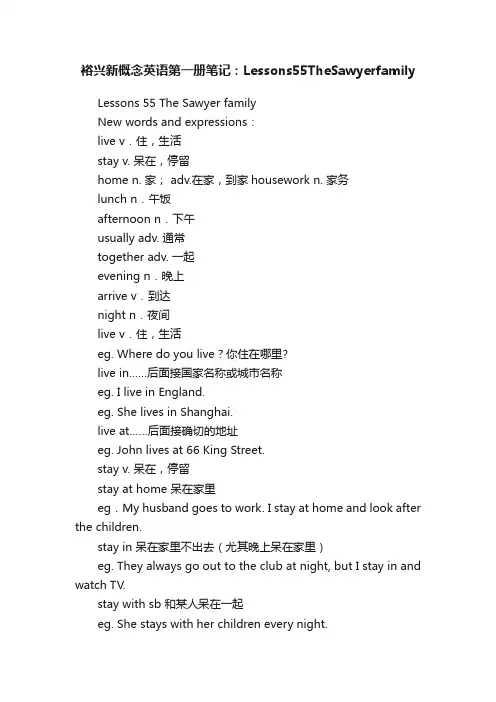
裕兴新概念英语第一册笔记:Lessons55TheSawyerfamilyLessons 55 The Sawyer familyNew words and expressions:live v.住,生活stay v. 呆在,停留home n. 家; adv.在家,到家housework n. 家务lunch n.午饭afternoon n.下午usually adv. 通常together adv. 一起evening n.晚上arrive v.到达night n.夜间live v.住,生活eg. Where do you live?你住在哪里?live in……后面接国家名称或城市名称eg. I live in England.eg. She lives in Shanghai.live at……后面接确切的地址eg. John lives at 66 King Street.stay v. 呆在,停留stay at home 呆在家里eg.My husband goes to work. I stay at home and look after the children.stay in 呆在家里不出去(尤其晚上呆在家里)eg. They always go out to the club at night, but I stay in and watch TV.stay with sb 和某人呆在一起eg. She stays with her children every night.eg. I like to stay with you.stay 是指临时,短时间居住。
stay at a hotel 住旅店stay at sb's house 住在别人的家live是指长久的居住,住在自己的家中eg. I live in an apartment. 我住在公寓里。
eg. I live in a house.home1) n.家eg. Welcome to my home.eg.My home is in Harbin.at home 在家eg. She always stays at home on weekends. make oneself at home 请随便一点,放松一点eg. Make yourself at home. 请随便一点。
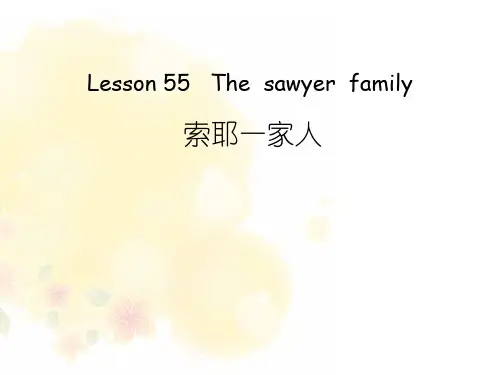
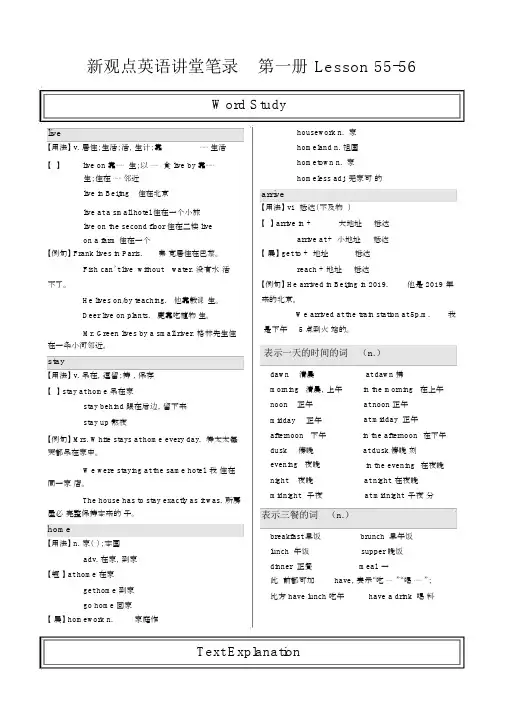
新观点英语讲堂笔录第一册 Lesson 55-56Word Studylive【用法】 v. 居住;生活;活,生计;靠⋯⋯生活【】live on 靠⋯⋯生;以⋯⋯食 live by 靠⋯⋯生;住在⋯⋯邻近live in Beijing住在北京live at a small hotel 住在一个小旅live on the second floor 住在二楼 liveon a farm 住在一个【例句】 Frank lives in Paris.弗克居住在巴黎。
Fish can’t live without water. 没有水活不了。
He lives on/by teaching.他靠教课生。
Deer live on plants.鹿靠吃植物生。
Mr. Green lives by a small river. 格林先生住在一条小河邻近。
stay【用法】 v. 呆在,逗留;持,保存【】 stay at home 呆在家stay behind 跟在后边,留下来stay up 熬夜【例句】 Mrs. White stays at home every day. 特太太每天都呆在家中。
We were staying at the same hotel. 我住在同一家店。
The house has to stay exactly as it was. 所房屋必完整保持本来的子。
home【用法】 n. 家();本国adv. 在家,到家【短】 at home 在家get home 到家go home 回家【展】 homework n.家庭作housework n. 家homeland n. 祖国hometown n. 家homeless adj. 无家可的arrive【用法】 vi. 抵达(不及物)【】 arrive in +大地址抵达arrive at + 小地址抵达【展】 get to + 地址抵达reach + 地址抵达【例句】 He arrived in Beijing in 2019.他是2019年来的北京。


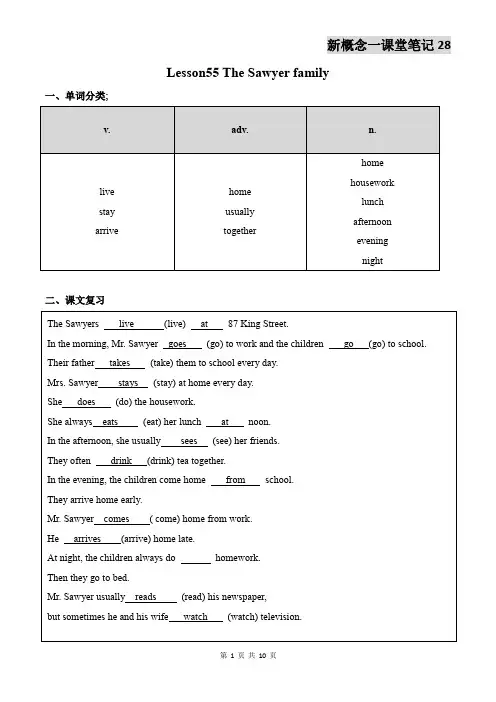
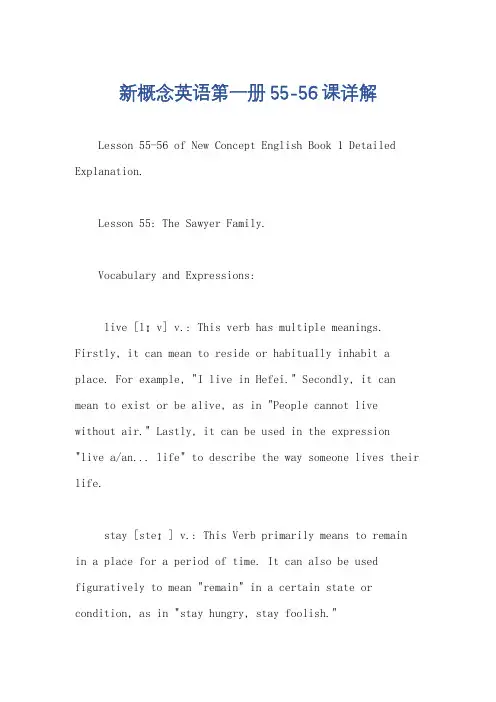
新概念英语第一册55-56课详解Lesson 55-56 of New Concept English Book 1 Detailed Explanation.Lesson 55: The Sawyer Family.Vocabulary and Expressions:live [lɪv] v.: This verb has multiple meanings. Firstly, it can mean to reside or habitually inhabit a place. For example, "I live in Hefei." Secondly, it can mean to exist or be alive, as in "People cannot live without air." Lastly, it can be used in the expression "live a/an... life" to describe the way someone lives their life.stay [steɪ] v.: This Verb primarily means to remain in a place for a period of time. It can also be used figuratively to mean "remain" in a certain state or condition, as in "stay hungry, stay foolish."home [həʊm] n./adv.: As a noun, it refers to the place where one lives. As an adverb, it means "to the place where one lives," as in "go home."housework ['haʊswɜːk] n.: This noun refers to the tasks related to maintaining a household, such as cleaning, cooking, and laundry.lunch [lʌnʃ] n.: This noun refers to the meal eaten in the middle of the day.afternoon [ɑːftə'nuːn] n.: This noun refers to the period of time between noon and evening.Text Explanation:Lesson 55 introduces the Sawyer family and their daily routine. The lesson begins by introducing the family members and their occupations. Mr. Sawyer works in an office, while Mrs. Sawyer stays at home. The children go to school. The lesson then goes on to describe their eveningactivities. Mr. Sawyer usually arrives home from work at about five o'clock, and the family then has their lunch together. In the afternoon, they often have a rest, andthen in the evening, they usually stay at home and watch television.Grammar Points:The use of "-s" or "-es" to form the third-person singular present tense of verbs is reinforced in this lesson. For example, "Mr. Sawyer usually arrives home from work at about five o'clock."The use of prepositions with "live" is also introduced. For example, "Mr. Sawyer lives in a town near London,"where "in" is used with a large place, and "Mrs. Sawyerlives at 87 King Street," where "at" is used with aspecific address.Lesson 56: What Do They Do?Vocabulary and Expressions:together [tə'geðə] adv.: This adverb means "in a group" or "side by side."evening ['iːvnɪŋ] n.: This noun refers to the time of day that comes after afternoon and before night.arrive [ə'raɪv] v.: This Verb means to reach a destination after a journey.night [naɪt] n.: This noun refers to the period of time from sunset to sunrise.Text Explanation:Lesson 56 continues the theme of the Sawyer family's daily life by asking the question, "What do they do?" The lesson provides information about the family's evening activities. Mr. Sawyer usually arrives home from work at about five o'clock, and then the family has their tea together. After tea, they usually sit in the living room and watch television. Sometimes, they go to the cinema orto the theater. On Sundays, they often go for a walk in the park.Grammar Points:The present tense of verbs is reinforced in this lesson, particularly the use of the third-person singular form.The lesson also introduces the use of modal verbs such as "can" and "usually" to express ability and frequency.Conclusion:Lessons 55 and 56 of New Concept English Book 1 focus on the Sawyer family's daily routine and activities. These lessons introduce new vocabulary and expressions related to family life, daily activities, and grammar points such as the use of "-s" or "-es" in the third-person singular present tense and the use of modal verbs. By learning these lessons, students can improve their understanding of family life in English-speaking countries and enhance theirlanguage skills in areas such as vocabulary, grammar, and comprehension.。
新概念英语单词第一册第55课:索耶一家人live [lv] v.住,生活【派生词】living生计【单词扩充】life生活 alive活着的【单词搭配】live on...靠……生活【单词例句】A:Who lives with you?A:你和谁住在一起?B:Kate and Nancy do.B:我跟凯特和南希…起住。
stay [ste] 停,逗留【单词扩充】stop over中途停留【单词搭配】stay at home待在家 stay still静止不动 stay out of不参与 stay up熬夜【单词例句】A: How long do you plan to stay here?A:你打算在这儿停留多久?B:I will stay here for about ten days.B:我将在这儿待大概10天。
home [hm] 家【派生词】homeland祖国【单词搭配】at home在家 go home回家【单词例句】A:I must go back home where many things are waiting for me to settleB: We're very sorry to see you go.A:我必须回国了,很多事正等着我去处理。
B:您要走了,我们感到非常遗憾。
housework['hauswa:k]家务【单词构造】house(房子)+work(工作)= housework(家务)【单词搭配】do the housework做家务【单词例句】A: My mother always says I spend too much time on watching TVA:我妈妈总是说我把太多的时间花费在看电视上。
B: Then you should finish your homework, and then help your parents with the housework some day.B:那你以后应该先完成家庭怍业,然后帮父母做些家务。
新概念第55课课文内容Lesson 55 The Sawyer family索耶一家人The Sawyer live at 87 King Street.In the morning, Mr. Sawyer goes to work and the children go to school.Their father takes them to school every day.Mrs. Sawyer stays at home every day.She does the housework.She always eats her lunch at noon.In the afternoon, she usually sees her friends.They often drink tea together.In the evening, the children come home from school.They arrive home early.Mr. Sawyer comes home from work.He arrives home late.At night, the children always do their homework.Then they go to bed.Mr. Sawyer usually reads his newspaper, but sometimes he and his wife watch television.索耶一家住在国王街87号。
早上,索耶先生去上班,孩子们去上学。
父亲每天送孩子们去上学。
索耶夫人每天呆在家里。
她料理家务。
她总是在正午吃午饭。
下午,她总是会见她的朋友。
她们经常在一起喝茶。
傍晚,孩子们放学回家。
他们到家很早。
索耶先生下班回家。
他到家很晚。
晚上,孩子们总是做作业,然后去睡觉。
索耶先生总是读报纸,但有时和他的妻子一起看电视。
【知识点讲解】
首先来公布上一期的答案:他/她从哪里来?翻译为:Where does he/she come from? 你答对了吗? 1. the saywers 意思是指“索亚一家人”。
在英语中把姓氏加上复数,再在前面加the 就能表示这一家人的意思。
比如The Youngs ,就代表“杨一家”。
2. 表示大的时段的单词,比如morning, noon, afternoon 和evening ,前面的介词都用in 。
比如in the morning, in the afternoon... 只有表示夜晚那个单词night ,要用at night.
3. go to school 意思是上学,在school 前面不加the;come home 或者是go home ,这里都不用to 和the.
4. They arrive home early. 这句话里的home 和early 都是副词,用来修饰和补充arrive 这个动词。
Lesson55
The Sawyers live at 87 King Street.
In the morning, Mr. Sawyer goes to work and the children go to school.
Their father takes them to school everyday. Mrs. Sawyer stays at home every day. She does the housework.
She always eats her lunch at noon. In the afternoon, she usually sees her friends. They often drink tea together.
In the evening, the children come home from school. They arrive home early.
Mr. Sawyer comes home from work. He arrives home late.
At night, the children always do their homework. Then they go to bed.
Mr. Sawyer usually reads his newspaper,
but sometimes he and his wife watch television.
索耶一家住在国王街87号。
早上,索耶先生去上班, 孩子们去上学。
父亲每天送孩子们去上学。
索耶夫人每天呆在家里。
她料理家务。
她总是在正午吃午饭。
下午,她总是会见她的朋友。
她们经常在一起喝茶。
傍晚,孩子们放学回家。
他们到家很早。
索耶先生下班回家。
他到家很晚。
晚上,孩子们总是做作业, 然后去睡觉。
索耶先生总是读报纸,
但有时和他的妻子一起看电视。